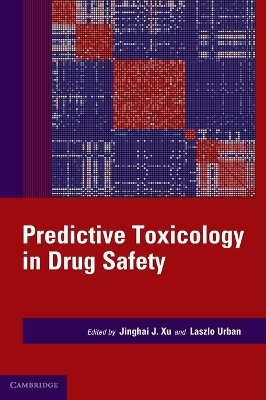
Predictive Toxicology in Drug Safety
Cambridge University Press (Verlag)
978-0-521-76364-6 (ISBN)
According to the Institute of Medicine (IOM) and U.S. Food and Drug Administration (FDA), 'developing new scientific approaches to detecting, understanding, predicting and preventing adverse events' was a critical path to the future of drug safety. This book brings together a collection of state-of-the-art chapters, written by experts in the drug safety field. It provides information on the present knowledge of drug side effects and their mitigation strategy during drug discovery, gives guidance for risk assessment and promotes evidence-based toxicology. Each specific area of toxicology relevant for drug discovery is discussed in detail, including theory, experimental approaches and data interpretation supported by comprehensive up-to-date references. Many chapters provide fascinating case studies, which are of general interest for those who have basic science training and are interested in how chemicals interact with the human body.
Jinghai James Xu, Ph.D. is currently Senior Director of Knowledge Discovery and Knowledge Management at Merck Research Laboratory, New Jersey, where he guides strategic directions of integrating external and internal knowledge to enhance the probability of success of pharmaceutical research and development. Before joining Merck he held positions of increasing responsibility at Pfizer, first at its Groton Laboratories, then at its Cambridge-based Systems Biology group, Research Technology Center. While at Pfizer, he led research directions in predictive toxicology, in vitro ADMET assay development and implementation, in vitro in vivo correlations, high content screening, automated image analysis, systems biology and systems toxicology. Prior to Pfizer, he worked at the advanced technology group at Curagen Corp. Dr Xu received his Ph.D. in Toxicology under the guidance of Professor Peter C. Dedon at MIT (in Cambridge, MA, USA). He has been honored with numerous awards including the Pfizer Central Research Achievement Award. He has published many book chapters, patent applications and scientific papers. He also speaks frequently at professional conferences about the value of implementing predictive technologies for drug efficacy and safety early in the drug R and D process. He serves both as an author and editor for scientific publishers such as Cambridge University Press, Wiley and Sons, and Bentham Science. Dr Laszlo Urban is current Executive Director and Global Head of Preclinical Safety Profiling at the Novartis Institute for Biomedical Research. Dr Urban has been actively involved in organizations such as the European Neuropeptide Club, the Society for Biomolecular Sciences and the International Association for the Study of Pain. His most recent published works include Hit and Lead Profiling (2009).
Part I. Specific Areas of Predictive Toxicology: 1. The human predictive value of combined animal toxicity testing: current state and emerging approaches Harry M. Olson and Thomas S. Davies; 2. Screening approaches for genetic toxicity Jiri Aubrecht; 3. Cardiac safety Martin Traebert and Berengere Dumotier; 4. Predicting drug-induced liver injury: safer patients or safer drugs? Jinghai James Xu; 5. In vitro evaluation of metabolic drug-drug interactions Albert P. Li; 6. Reliability of reactive metabolite and covalent binding assessments in prediction of idiosyncratic drug toxicity Amit S. Kalgutkar; 7. Immunotoxicology of haptens and nucleic acids Jörg Vollmer; 8. Predictive models for neurotoxicity assessment Lucio G. Costa, Gennaro Giordano and Marina Guizzetti; 9. De-risking developmental toxicity-mediated drug attrition in the pharmaceutical industry Terence R. S. Ozolins; Part II. Integrated Approaches of Predictive Toxicology: 10. Integrated approaches to lead optimization: improving the therapeutic index Laszlo Urban, Jianling Wang, Dejan Bojanic and Susan Ward; 11. Predictive toxicology approaches for oncology drugs Timothy J. Maziasz, Vivek J. Kadambi and Carl L. Alden; 12. Mechanism-based toxicity studies for drug development Monicah A. Otieno and Lois D. Lehman-McKeeman; 13. Fish embryos as alternative models for drug safety evaluation Stefan Scholz, Anita Büttner, Nils Klüver and Joaquin Guinea; 14. The role of genetic-modified mouse models in predictive toxicology Glenn H. Cantor; 15. Toxicogenomic and pathway analysis Bin Lu; 16. Drug safety biomarkers David Gerhold and Frank D. Sistare; 17. Application of TK/PD modeling in predicting dose-limiting toxicity Li J. Yu, Lee Silverman, Carl Alden, Guohui Liu, Shimoga Prakash and Frank Lee; 18. Prediction of therapeutic index of antibody-based therapeutics: mathematical modeling approaches Kapil Mayawala and Bruce Gomes; 19. Vaccine toxicology: non-clinical predictive strategies Sarah Gould and Raymond Oomen.
| Erscheint lt. Verlag | 27.9.2010 |
|---|---|
| Zusatzinfo | 35 Tables, unspecified; 8 Halftones, unspecified; 76 Line drawings, unspecified |
| Verlagsort | Cambridge |
| Sprache | englisch |
| Maße | 184 x 254 mm |
| Gewicht | 1000 g |
| Themenwelt | Medizin / Pharmazie ► Medizinische Fachgebiete ► Pharmakologie / Pharmakotherapie |
| Medizin / Pharmazie ► Pflege | |
| Medizin / Pharmazie ► Pharmazie ► PTA / PKA | |
| Medizin / Pharmazie ► Physiotherapie / Ergotherapie ► Orthopädie | |
| Technik ► Medizintechnik | |
| Technik ► Umwelttechnik / Biotechnologie | |
| ISBN-10 | 0-521-76364-9 / 0521763649 |
| ISBN-13 | 978-0-521-76364-6 / 9780521763646 |
| Zustand | Neuware |
| Haben Sie eine Frage zum Produkt? |
aus dem Bereich


